The Facebook I.P.O. Was Not A “Disaster.”
Contrary to what you're hearing, the Facebook I.P.O. was a huge success.
In a column in today’s New York Times that touches on broader issues, Ross Douthat joins the chorus of those called Facebook’s Initial Public Offering a “disaster.” It’s easy to see on the surface why people would say this, and indeed it’s a premise that I largely accepted myself in the two posts I’ve written on this topic (here and here). Just take a look at the difference between the I.P.O. price of $38 per share, and the current share price, which closed at $31.91 on Friday afternoon. That’s a decline of $6.09, or 16.03%, in just about a week of trading, though it’s worth noting that the majority of that decline came very early on in trading and the the share price was relatively stable for much of last week. Clearly, that’s an indication that the market as a whole has made a judgment that Facebook is not worth the $38.00/share that it was initially priced at, as well as the fact that investors have most likely soured on the idea of putting money on the company at the moment.
If you judge the success of the I.P.O. by whether the stock has gone up or down in just 5 1/2 days of trading, then I suppose you’d have an argument that the Facebook I.P.O. has been a disaster. However, unless you’re a day trader or someone looking to make a quick buck on a stock, what has happened to the share price of Facebook in the past week isn’t necessarily relevant. The real question is the company’s long-term prospects for growth, and how that will impact the share price six months, a year, or five years from now. There’s simply no way to know the answer to that question today, and such a short period of trading history doesn’t really give us sufficient evidence to make a judgment on that issue. So, calling the I.P.O. a disaster as Douthat does is either being incredibly short-sighted, or it’s a rather simplistic concentration on very short-term results while completely ignoring the future over the long term.
Douthat’s argument misses another point, though, and it’s one that his own New York Times colleague Joe Nocera made on Friday:
[L]et’s be honest. Were there really any long-term investors in Facebook that first day? Judging by the torrent of criticism that has rained on Facebook and Morgan Stanley, it sure doesn’t appear that way. Instead, what the Facebook aftermath suggests is that we’ve all become brainwashed into believing that, when it comes to I.P.O.s, up is down and down is up. A successful I.P.O. is one where the company gets hosed by Wall Street. A failed I.P.O. is one where the company’s interests, not those of Wall Street speculators, are served. It’s Alice in Wonderland goes to Wall Street.
This is perhaps the most important point about an I.P.O. that people seem to forget. The entire purpose of an Initial Public Offering, after all, is to bring cash into the company by offering ownership shares in the company for sale on the open market. Since these I.P.O.’s are all done through investment banks and brokerage houses, though, there are parties with conflicting interests at the table prior to the day the stock goes public. It’s in the best interest of the banks and brokerage houses that the stock be priced somewhere below what the market might pay for it, because they are the ones who buy the stock from the corporation in order to either sell it to their clients or keep it in their own portfolio in the hope that it will gain value. It’s in the best interest of the corporation that the initial offering price be as near to the top of market value as possible so that they maximize the value of the shares of ownership that they’re selling. Remember, after I.P.O. day a corporation reaps almost no benefit from what happens to its share price unless it holds what are called “Treasury Shares” in its own name, or it decides to issue additional shares at some point in the future. Who benefits if the stock goes up sharply on I.P.O. Day or immediately thereafter? The banks and brokerage houses. As Nocera notes, we’ve somehow gotten to a point where an I.P.O. is considered successful only if it results in more money ending up in the hands of the investment community than in the hands of the issuing company. That seems like an odd perversion given the act that the entire purpose of the I.P.O was to raise cash for the company.
Nocera contrasts the Facebook I.P.O. with another recent offering for another, smaller, Tech company:
I am referring to Splunk, an 8-year-old, money-losing data analytics company that went public five weeks ago. Splunk’s investment bankers priced the stock at $17 a share. But it closed its first day of trading at $35.48 — a gain of 109 percent — before declining over the next month. (It has rebounded in the last week.)
The offering raised $229.5 million for the company. But if the bankers had done a better job of pricing the shares — and had come closer to the $35 a share that investors were willing to pay — the company would have reaped twice as much. Putting cash in a company’s coffers is supposed to be the whole purpose of an I.P.O. Isn’t it?
Who got all that extra money? The hedge fund managers and Wall Street insiders who were allocated shares — and who immediately flipped those shares for a quick, easy profit. That’s how I.P.O.s work nowadays: It is assumed that the offering will be underpriced, and anybody who can get shares at the I.P.O. price is guaranteed a killing. This pattern has become the very definition of a successful public offering.
Why is it that Splunk’s I.P.O. is viewed as a success, while Facebook’s is viewed as a failure? It strikes me that you can only accept that argument if you hold a very short-term view of success in the business world. As Nocera notes, we don’t know where Facebook will be in five or ten years, and how it will fend in the years to come against companies like Google, Microsoft, and even Twitter. However, thanks to that “disaster” of an I.P.O., they have something like $16 billion in the bank, a CEO who has had a remarkable run of success for someone so young, and a user base of nearly a billion people worldwide. It strikes me that this I.P.O. was far more of a success than the short-term people are willing to admit.
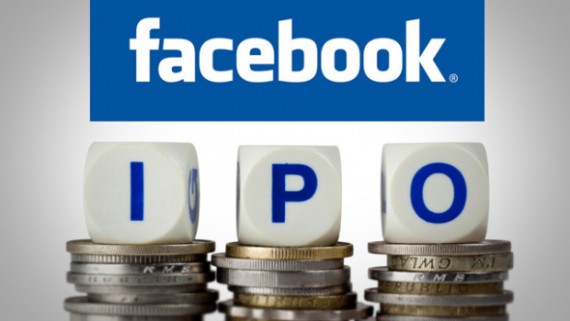

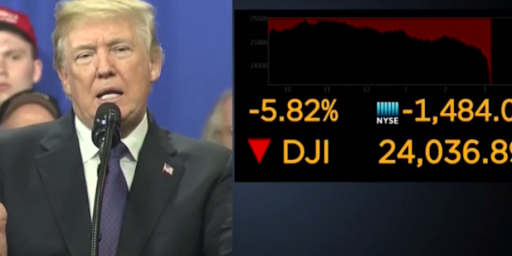
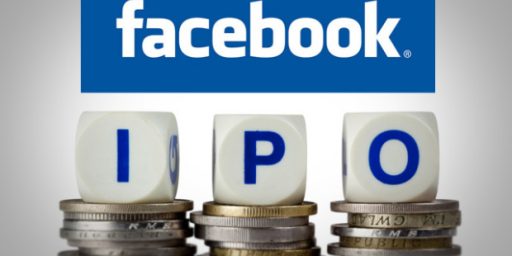

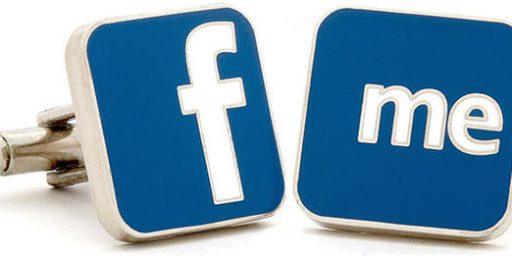
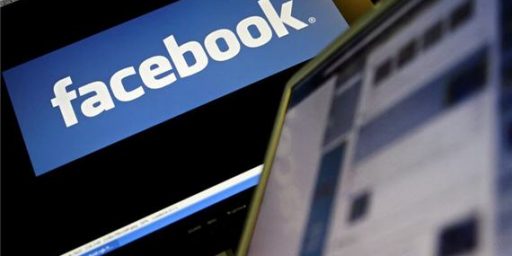
The bit where FB downgraded their earnings for Q2 and only selected investors got to know about it? Dunno about you, but that seems like a failure to me.
@swearyanthony:
Umm you are aware that those facts were all included in the updated Form 10-Q that Facebook made public before I.P.O. Day, right?
In fact, Facebook’s IPO documents were updated at least four times prior to the day the stock went public.
@swearyanthony:
I’d also suggest you read this piece, written by someone who spent two decades in the investment banking business.
From the link:
Amen, brother….
Some of my co-workers were hoping to get in on the IPO, thinking they’d be outsmarting the market or something: get in, get the gains, then get out. A great idea…but not for anyone with an E*trade account.
Think about the insiders at Splunk who owned options, rather than full shares. When the stock goes public, they exercise their options, perhaps priced at $1, to buy the $17 shares. That creates an instant $16 profit, but also a $6 tax bill, per share. So to be conservative, you do same-day sales for a fraction of your options to immediately cover your tax (between 1/4 and 1/3).
That leaves you with taxes covered and holdings priced at $16, valued at the end of the day at $35. That’s a healthy paper profit, and something you can safely sit on for a few years, perhaps stretching to long term capital gains.
On the other hand, if the IPO had been at $35 and descended to $30, you’d pay tax on options exercised at $35, and then old declining shares …
The Facebook IPO was a disaster for those who want people to buy stocks in further tech IPOs. The system was rigged, detailed information (not that waffly comment made in the SEC filings) was released to selected institutions only, and all the money was taken off the table. A price with a P/E/ of 100 is ridiculous. Zuckerman will now be totally under the gun to produce profit each quarter, no matter what. Anyone think that FB will now keep any of its promises about not selling its users’ information? Forget it–data selling and data mining is the only possible way they can make money. Look at how Zuckerman treated Zynga, and then promise me that he won’t treat FB users the same.
The Smartest Men In the Room forgot the first doctrine of Enlightened Self-Interest: don’t be a greedy hog.
Nocera gets at the important point with this line – “Putting cash in a company’s coffers is supposed to be the whole purpose of an I.P.O. Isn’t it?”
Markets are about the allocation of capital. They do not exist to make investors money.
Mike
Remember that companies get money in their coffers two ways. They get cash for shares they sell, and they get value for shares they retain. A high, respected, and growing, market capitalization helps them for years and years to come.
It is not at all a one time thing, and a positive offering helps the forward-looking growth story.
FB will be made or dismayed in late July when they report their most recent earnings.
A lot of investors are out a lot of money right now in the short period since the IPO. Obviously a lot of them have already cut their losses given the stock is down almost ten percent since the IPO.
And seriously Doug, Tom Dougherty?
Yep, a real winner if you’re going for long term* investment.
“*”